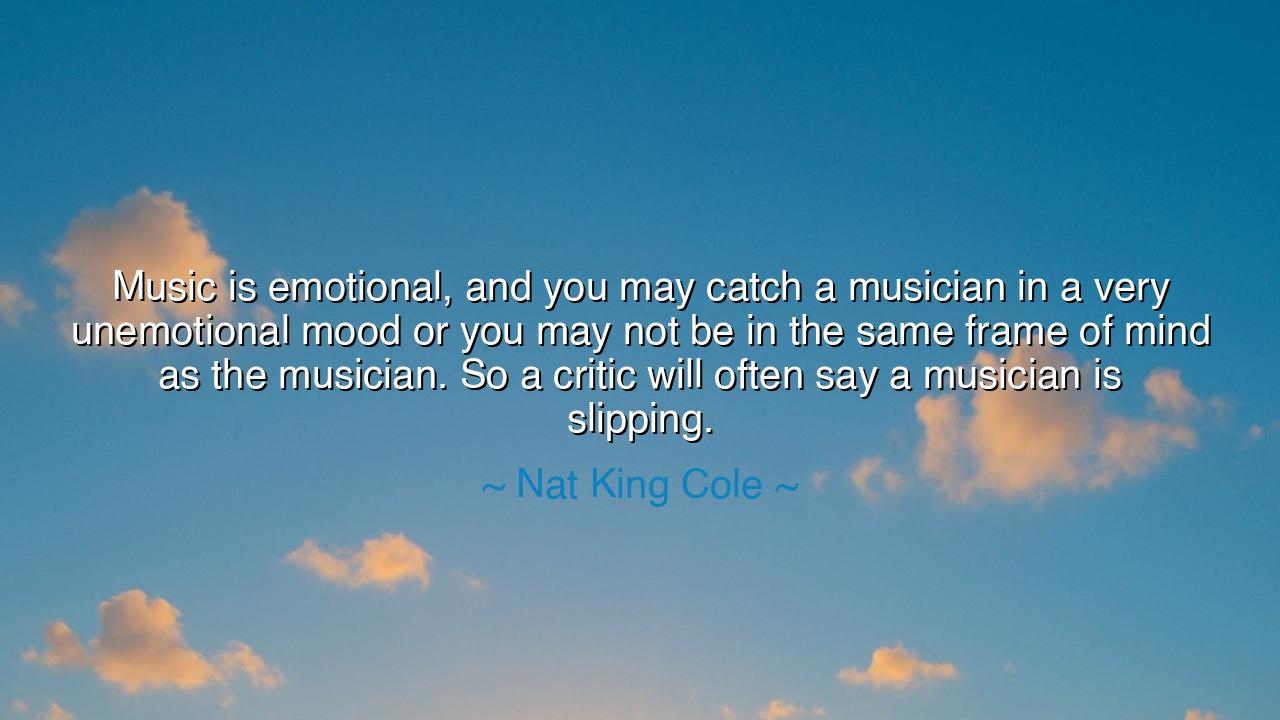
Music is emotional, and you may catch a musician in a very
Music is emotional, and you may catch a musician in a very unemotional mood or you may not be in the same frame of mind as the musician. So a critic will often say a musician is slipping.






Hear the gentle wisdom of Nat King Cole, who declared: “Music is emotional, and you may catch a musician in a very unemotional mood or you may not be in the same frame of mind as the musician. So a critic will often say a musician is slipping.” In these words, he speaks of the fragile nature of art, born not from cold machines, but from the human heart. For unlike stone or steel, music is shaped by feelings, moods, and spirits that rise and fall like the tides. To expect perfection always is to forget that behind every note lies a soul, and every soul is touched by seasons of change.
The ancients understood that the gift of music was divine fire. To them, it was the voice of the gods, poured through mortal vessels. Yet those vessels were human—subject to fatigue, sorrow, and joy. Even Orpheus, whose song could charm the stones, faltered when grief overcame him. Thus Cole’s words remind us that the power of a musician is not constant, not mechanical, but living. And as all living things, it ebbs and flows with the winds of the spirit.
Consider the life of Billie Holiday, whose voice was a river of pain and beauty. On nights when sorrow consumed her, her songs carried a weight that pierced the hearts of thousands. Yet on other nights, when weariness dulled her spirit, critics judged her harshly, declaring she had lost her gift. But they failed to see that it was not loss—it was humanity. For the same pain that dulled her voice one day gave it unimaginable depth on another. To live by emotion is to live with fluctuation, and in this lies both the peril and the power of the artist.
Nat King Cole warns us also of the critic, whose eye is often blind to the hidden struggles of the heart. A critic may hear only the sound, not the silence behind it. They may declare that a musician is “slipping,” when in truth the artist is merely caught in a season of emptiness, awaiting the return of fire. But this so-called weakness is not failure—it is part of the eternal rhythm of creation. Just as winter precedes spring, so too do quiet seasons precede the bursting forth of new inspiration.
The lesson here is not only for musicians, but for all who create, labor, and strive. We must remember that emotion drives much of our greatness. There will be days when the fire burns hot and the work flows effortlessly. And there will be days when the fire dwindles, when nothing seems alive. These moments do not mean we are “slipping”—they mean we are human. To demand unending brilliance is to demand the impossible. True strength is found not in constant intensity, but in resilience—the courage to return, again and again, to the work.
To you who listen, take this wisdom as comfort: do not despair when your spirit feels dull, nor when others misjudge your season of quiet. Even the greatest voices falter, even the brightest flames dim. What matters is not the fleeting judgment of critics, but the enduring faithfulness to your gift. Keep working, keep practicing, keep waiting for the return of inspiration. For it will return, as surely as dawn follows the night.
Practical guidance follows: honor your emotions, but do not be enslaved by them. Allow yourself rest when the heart grows weary, but do not abandon your art. Know that your worth is not measured by one performance, one day, or one opinion. And when critics speak of “slipping,” remember Cole’s truth: their judgment is shallow, but your journey is deep.
Thus remember Nat King Cole’s words: music is emotional, and so is life. Do not fear the ebb and flow of your spirit. In the end, it is this very humanity—this imperfection, this vulnerability—that gives your song its beauty. And those who truly listen will hear not only the notes, but the soul behind them.






AAdministratorAdministrator
Welcome, honored guests. Please leave a comment, we will respond soon